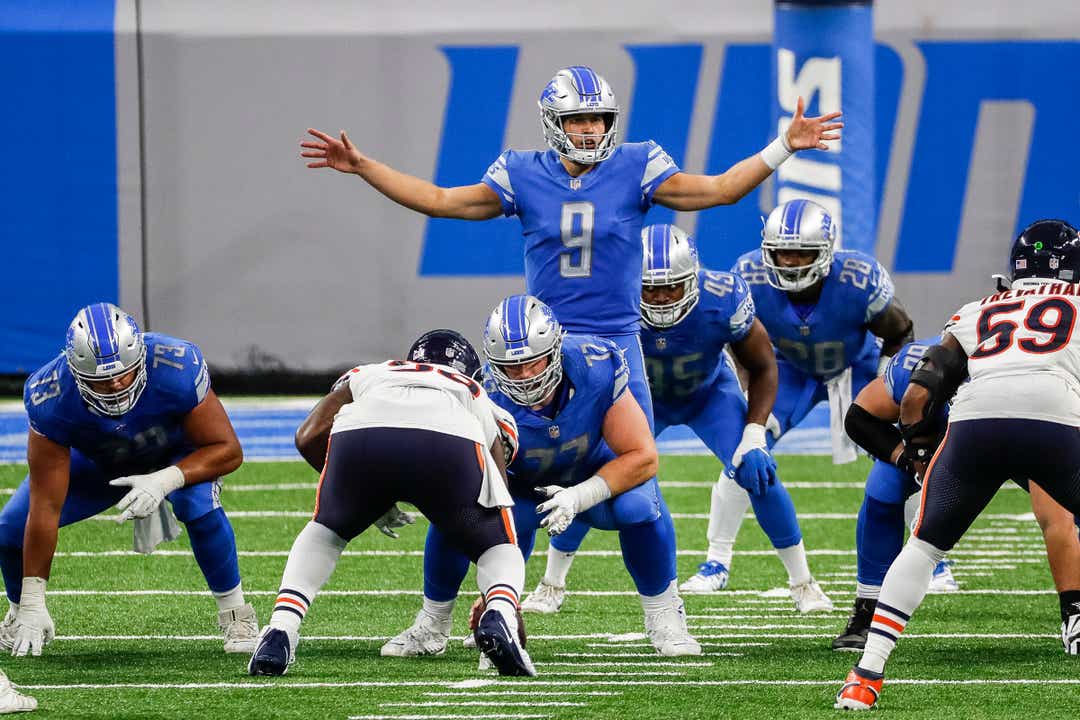As the Detroit Lions lined up for a key third-down play midway through the second quarter of last week’s loss to the Chicago Bears, linebacker Danny Trevathan yelled for teammate Roquan Smith a few yards away.
“Hey, Ro. Hey, Ro,” Trevathan said, before waving his hands across each other as if to signal a crossing route was coming their way.
Moments later, after moving Kerryon Johnson’s spot in the backfield to adjust his protection, Matthew Stafford called for the snap and, sure enough, Jamal Agnew, the Lions’ slot receiver to the right, ran across formation toward the left corner of the end zone.

Smith followed Agnew in coverage, leaving Trevathan to account for tight end Jesse James, and with rookie cornerback Jaylon Johnson closing in from behind, Stafford’s third-down pass to Agnew fell incomplete and the Lions had to settle for a field goal.
On-field communication between players has always been a point of fascination, but while calls by quarterbacks have historically been most noticeable — think Peyton Manning’s “Omaha,” or Stafford’s “Blue 80” — the lack of fans in the stands has given players, coaches and everyone watching at home more to listen for during games.
[ The Free Press has started a new digital subscription model. Here’s how you can gain access to our most exclusive Lions content. ]
“That’s one of the things I think that we’re just beginning to learn, take a look at,” Lions offensive coordinator Darrell Bevell said. “Like, even in-game situations, how much are they hearing, how much are they able to decipher? And then, I mean, there was a couple times you could hear the Bears yelling from the sideline.”
More: Detroit Lions’ Matthew Stafford explains why he took a knee during national anthem
NFL teams have long studied the TV copy of games in an effort to match the sounds heard on the network broadcast with what happens on the field.
This year’s TV tapes, which picked up everything Trevathan’s defensive check to the guffaws of players after big hits, have the potential to be juicier than ever.
(Coaches’ film, shot from high-sideline and end-zone angles, does not have audio.)
“There’s always coaches that are involved in going back to the TV copies and seeing what you can glean from that,” Bevell said. “So we’re doing everything that we can to be able to help ourselves in those situations and I think it’s really a learning experience for all of us right now with the way these games are going and the new low-hum of the crowd noise.”

One game into the season, Bevell said it’s too early know how much more information teams will be able to glean from what they hear on the field, but the Lions are conscious enough of it that Bevell said they’re adjusting their signals and calls.
“A lot of the stuff, honestly, is really pretty common knowledge,” Lions coach Matt Patricia said. “What you’re trying to identify is what’s taking place in-game and if anything’s switched. Peyton Manning — this is a classic example. We’re playing Peyton Manning one year, and we knew, obviously, the audibles at the line of scrimmage. I got two young linebackers, Jerod Mayo and Gary Guyton, and we had one of the calls. The first time he said it, they took off, and it was a great play. Two young linebackers really excited about the play, and it was a TFL (tackle for loss).
“The next time he comes to the line of scrimmage and dummies the thing, and Gary goes through the middle, and I think Jerod did, too. Pretty sure (Dallas) Clark hit the thing over the middle for about 35 yards deep.”
More important than what’s being said is the nuance of the situation it’s being said in, Patricia said.
“If you get a piece of communication you say, ‘OK, here’s what I heard, but this guy is showing me this, or this formation is showing me that, or this set is usually this,’” Patricia said. “You take it as what it is, but you still got to go out and play and react at that standpoint.”
Lions linebacker Jarrad Davis said he heard about the same sounds Sunday as he did in years past when playing in stadiums full of fans.
The Lions will play in empty stadiums at least the next three weeks.
“I know it’s quieter, but you still hear the same stuff,” Davis said. “When you’re playing a game, yeah, the crowd’s loud. It’s very loud out there, but at the end of the day, you lock in, you kind of get in a flow state and you can hear certain things from certain people just how you normally would.”
More: Detroit Lions LB Jarrad Davis on his reduced role: ‘I got to trust the coaches’
Still, Davis admitted “there’s some things that we can’t always yell out” and the Lions are “talking a little bit quieter” on defense to avoid spilling some secrets.
“It’s all going to be heard by the opponent,” NFL Network analyst and former Lions coach Steve Mariucci said. “There’s no more secrets unless you have some code words that mean something different. And that in itself is going to be a huge change, because crowd noise in football is such an advantage because it’s such a communicative sport and now we don’t have that.”
Contact Dave Birkett at dbirkett@freepress.com. Follow him on Twitter @davebirkett.